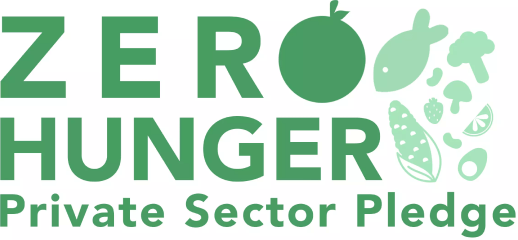
New Accountability report finds that private sector invested USD 440 million to fight hunger
The Zero Hunger Private Sector Pledge today released its latest Biennial Accountability Report – “From Pledge to Action”.
Between 2021 and 2024, private sector companies deployed USD 440 million in 40 priority countries, to achieve Sustainable Development Goal 2: Zero Hunger. Despite multiple crises around the world and volatility across sectors, companies are demonstrating tangible actions to end global hunger and malnutrition.
The Zero Hunger Private Sector Pledge launched in 2021 at the UN Food Systems Summit. Since then, more than 100 companies committed close to USD 650 million, investing in evidence-based solutions to end hunger. Now with four companies – AGREA, Nutriset, Rabobank and Soilless Farm Lab - exceeding their commitments by a combined USD 151 million, the total pledged tally reaches nearly USD 800 million.
“At a time when aid budgets and nutrition investments are stretched to their limits, the private sector is offering a powerful sign that commitments followed by accountable action can still make zero hunger possible. However, these investments are still only a fraction of what is needed. Progress is too slow. We need bold and accelerated action” – Lawrence Haddad, Executive Director - Global Alliance for Improved Nutrition.
The Zero Hunger Pledge offers a roadmap based on the Ceres2030 project that identifies 90 priority countries and 10 high-impact investment areas to end hunger. As part of the biennial review, pledges valued over USD 1 million are verified by independent consultants. The 2023-2024 reporting period reviewed commitments made by 16 companies.
“The results are impressive with companies converting their pledges to action. This report highlights the private sector’s commitment to sustainability through their investments to build the resilience of smallholder farmers and improve their value chains, especially by reducing post-harvest losses. However critical gaps remain, especially with insufficient investments targeting those countries where it is most needed.” – Carin Smaller, Executive Director – Shamba Centre for Food & Climate.
Key Findings
- Companies are continuing to make long-term, systemic investments - As in the previous reporting period, most deployments were in the form of core business investments (79%, USD 168 million), reflecting continued integration of sustainability in long-term business strategy.
- Companies are investing primarily on building resilience on farms and across value chains - Most investments supported resilience on farms (47%, USD 100 million) and across value chains (46%, USD 99 million). However, investments in social protection and training declined from 27% to 7% (USD 14 million) in this reporting cycle.
- More investments are needed in high-priority countries - Only six projects (3%) were deployed in high-priority countries — a decline from 7% in 2023. While medium-priority countries received 43 projects (24%), the largest number (133) and proportion of projects (73%) targeted low-priority countries.
According to the latest estimates, an additional USD 512 billion is needed – beyond current spending – to achieve SDG 2: Zero Hunger by 2030. Closing the USD 512 billion financing gap requires scaling large investments and shifting corporate mindsets to fully integrate sustainability as a core competitive advantage.
The Zero Hunger Private Sector Pledge calls on companies worldwide to seize this opportunity and invest in strengthening the resilience of value chains while improving incomes, diets, and environmental sustainability. The sustained engagement and investments from companies, through the Zero Hunger Pledge is encouraging. The scale and speed, however, must accelerate.
